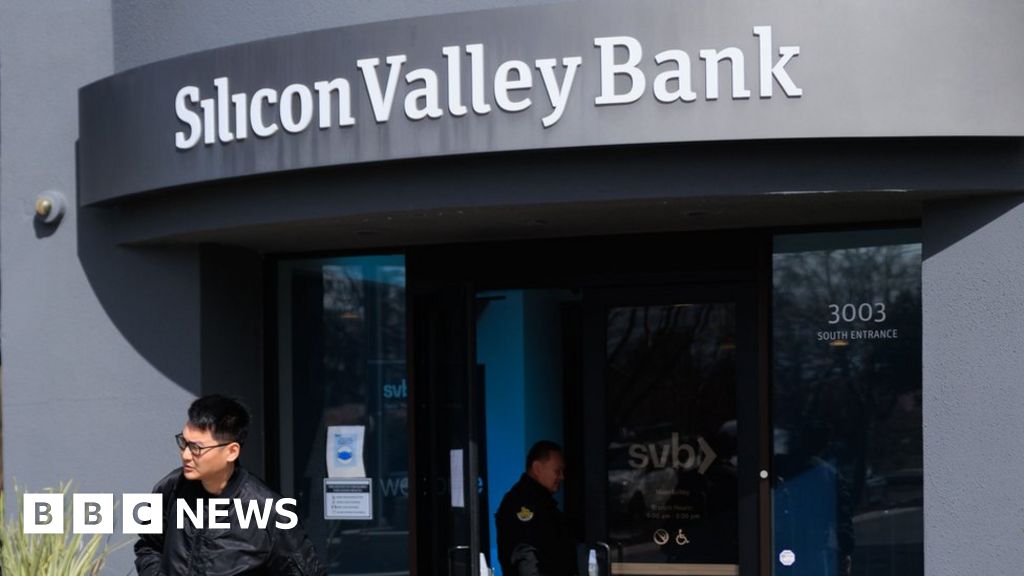Silicon Valley Bank: 500 Jobs Cut By New Owner First Citizens

The new owner of Silicon Valley Bank's (SVB) US operations, First Citizens, is cutting around 500 roles held by former SVB workers, the BBC understands.
Two months ago, First Citizens bought the business after SVB's collapse.
The failure of SVB, along with two other US banks, triggered fears of a more widespread banking crisis, which forced authorities to step in.
SVB's business in the UK was bought in March by London-headquartered banking giant HSBC for a nominal £1 ($1.25).
In an email seen by the BBC, First Citizens' chief executive Frank Holding highlighted the problems faced by SVB earlier this year and said the cuts will affect: "select SVB corporate functions and do not include any personnel in client-facing positions."
"The team in India that supports SVB is not impacted by the changes," he added.
The BBC understands that the job cuts amount to around 3% of the company's total workforce.
The story was first reported by US-based news website Axios.
First Citizens is based in Raleigh, in the US state of North Carolina and calls itself America's biggest family-controlled bank. It has been one of the largest buyers of troubled banks in recent years.
Under the deal, all 17 former SVB branches opened under the First Citizens brand.
In the UK, HSBC bought SVB's British operations in a deal led by the government and the Bank of England. Earlier this month, HSBC said its profits had got a $1.5bn boost from the takeover.
Also this month, Greg Becker, the former boss of SVB, apologised during a Congressional testimony, blaming rising interest rates and mounting withdrawals by customers as key causes of the bank's collapse.
Interest rates were cut sharply during the 2008 global financial crisis and again during the Covid pandemic as central banks around the world sought to encourage economic growth.
But rates have been rising over the past year as central banks try to rein in soaring prices.
These rate rises have hit the value of investments in which most banks keep some of their customers' money, and contributed to the bank failures in the US.
His account contrasts with those of regulators who blamed SVB's leadership for its failure to manage interest rate risks or diversify its business.
The collapse of SVB was followed by the failure of another US lender, Signature Bank and early May, JP Morgan Chase took over First Republic, which had also been under pressure.
Meanwhile in Europe, Swiss officials brokered a rescue deal for troubled banking giant Credit Suisse by its rival UBS, which Swiss prosecutors are investigating.
From Chip War To Cloud War: The Next Frontier In Global Tech Competition
The global chip war, characterized by intense competition among nations and corporations for supremacy in semiconductor ... Read more
The High Stakes Of Tech Regulation: Security Risks And Market Dynamics
The influence of tech giants in the global economy continues to grow, raising crucial questions about how to balance sec... Read more
The Tyranny Of Instagram Interiors: Why It's Time To Break Free From Algorithm-Driven Aesthetics
Instagram has become a dominant force in shaping interior design trends, offering a seemingly endless stream of inspirat... Read more
The Data Crunch In AI: Strategies For Sustainability
Exploring solutions to the imminent exhaustion of internet data for AI training.As the artificial intelligence (AI) indu... Read more
Google Abandons Four-Year Effort To Remove Cookies From Chrome Browser
After four years of dedicated effort, Google has decided to abandon its plan to remove third-party cookies from its Chro... Read more
LinkedIn Embraces AI And Gamification To Drive User Engagement And Revenue
In an effort to tackle slowing revenue growth and enhance user engagement, LinkedIn is turning to artificial intelligenc... Read more

